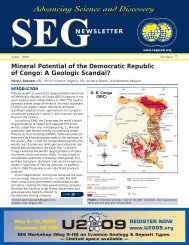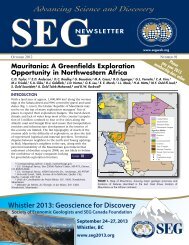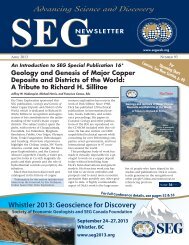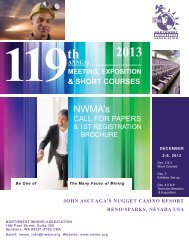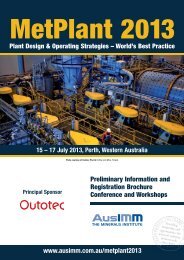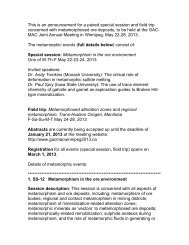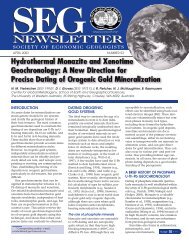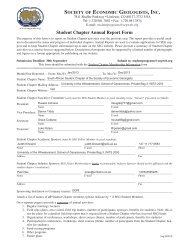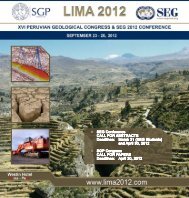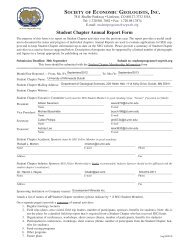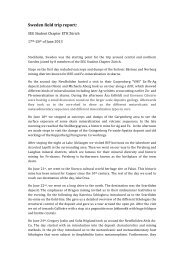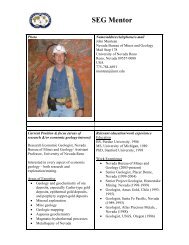SEG - Society of Economic Geologists
SEG - Society of Economic Geologists
SEG - Society of Economic Geologists
Create successful ePaper yourself
Turn your PDF publications into a flip-book with our unique Google optimized e-Paper software.
26 <strong>SEG</strong> NEWSLETTER No 90 • JULY 2012<br />
<strong>SEG</strong> NEWS<br />
... from 25<br />
Candidates for <strong>SEG</strong> Officers: Pr<strong>of</strong>iles and Vision Statements (Continued)<br />
Deposits in Nevada, USA: Critical Geo -<br />
logic Characteristics and Viable Models,<br />
published in 2005. Most recently, she<br />
has been a coauthor on a comprehensive<br />
model describing a magmatic hypothesis<br />
for the formation <strong>of</strong> these deposits,<br />
which was published in Nature Geo -<br />
science in 2011.<br />
Jean has been an <strong>SEG</strong> fellow since<br />
1983, serving on several <strong>SEG</strong> committees,<br />
and she was selected as the <strong>Society</strong>’s<br />
International Exchange Lecturer in<br />
2004. She has been a member <strong>of</strong> the<br />
society’s Publication Board and she has<br />
been an associate editor for the journal,<br />
<strong>Economic</strong> Geology, since 2000.<br />
Vision Statement<br />
In the nearly 30 years that I have been<br />
an <strong>SEG</strong> member, I have watched the<br />
<strong>Society</strong> evolve to become an international<br />
organization that is now highly<br />
invested in supporting students who are<br />
the future <strong>of</strong> our <strong>Society</strong> and our pr<strong>of</strong>ession.<br />
My vision for <strong>SEG</strong> is for the<br />
<strong>Society</strong> to continue along a path <strong>of</strong> recognizing<br />
and supporting, equally, economic<br />
geologists from all backgrounds<br />
and ethnicities.<br />
Our <strong>Society</strong> is increasingly relevant<br />
and essential in a world where resource<br />
consumption is accelerating as populous<br />
second- and third-world countries<br />
seek to improve their standards <strong>of</strong> living<br />
through increased resource consumption.<br />
Through our journal, workshops,<br />
conferences, research support for students<br />
and lecture series, we will continue<br />
to contribute to improved resource<br />
exploration strategies, improved understanding<br />
<strong>of</strong> ore deposit processes, and<br />
advances in mining and mineral processing.<br />
As we develop new deposits<br />
and new technologies for discovery, it<br />
is incumbent upon us to be leaders in<br />
balancing discovery and development<br />
<strong>of</strong> natural resources with ethical behavior<br />
regarding social and environmental<br />
needs. We have the opportunity and<br />
obligation to lead by example and I<br />
look forward to our <strong>Society</strong> continuing<br />
to be a leader in innovative and ethical<br />
resource exploration and production as<br />
we move forward into the future.<br />
<strong>SEG</strong><br />
www.segweb.org<br />
Candidate for Councilor (2013–2015)<br />
THOMAS MONECKE (<strong>SEG</strong> 2003 FL)<br />
Thomas completed his<br />
undergraduate and<br />
graduate studies at the<br />
University <strong>of</strong> Freiberg,<br />
Germany, which in -<br />
cluded a year as an ex -<br />
change student at the<br />
University <strong>of</strong> Edinburgh,<br />
Scotland. After gaining<br />
work experience at the Office for the<br />
Environment and Geology <strong>of</strong> the State<br />
<strong>of</strong> Saxony, Thomas commenced a doctoral<br />
study on a joint research project<br />
between the Centre for Ore Deposit<br />
Research at the University <strong>of</strong> Tasmania,<br />
Australia, and the University <strong>of</strong> Freiberg.<br />
He earned his Ph.D. in 2003 for his<br />
research on a volcanic-hosted massive<br />
sulfide deposit in northern Australia.<br />
Between 2003 and 2008, Thomas conducted<br />
postdoctoral research on modern<br />
and ancient gold-rich volcanichydrothermal<br />
systems at the Geological<br />
Survey <strong>of</strong> Canada, the University <strong>of</strong><br />
Ottawa, and the University <strong>of</strong> Kiel,<br />
Germany. In 2008, he joined the<br />
Colorado School <strong>of</strong> Mines as an assistant<br />
pr<strong>of</strong>essor in economic geology.<br />
Thomas’s main research interests center<br />
on the formation <strong>of</strong> precious and base<br />
metal deposits in modern and ancient,<br />
submarine and subaerial volcanic arcs,<br />
as well as volcanic and magmatic controls<br />
on the location and formation <strong>of</strong><br />
ore deposits in these environments. His<br />
research includes physical volcanology,<br />
the study <strong>of</strong> the evolution <strong>of</strong> volcanic<br />
textures during diagenesis, hydrothermal<br />
alteration, and metamorphism, and<br />
investigations into fluid-rock and fluidmineral<br />
interaction in hydrothermal<br />
environments. Over the past decade,<br />
Thomas and his research team have<br />
worked in volcanic terrains ranging from<br />
the Archean Abitibi greenstone belt in<br />
Canada to shallow marine hydrothermal<br />
systems in the Tyrrhenian Sea, Italy.<br />
The results <strong>of</strong> his research have been<br />
published in over 60 journal papers,<br />
book chapters, government publications,<br />
and field guides.<br />
His <strong>SEG</strong> service includes participation<br />
in various committees, including the<br />
<strong>SEG</strong> Education and Training Committee,<br />
the <strong>SEG</strong> Lindgren Award Committee, and<br />
the Organization Committees <strong>of</strong> the <strong>SEG</strong><br />
Keystone Conferences in 2010 and 2014.<br />
Thomas received the <strong>SEG</strong>’s Waldemar<br />
Lindgren Award in 2006 for his contributions<br />
to economic geology.<br />
Vision Statement<br />
One <strong>of</strong> <strong>SEG</strong>’s key objectives is to advance<br />
the science <strong>of</strong> geology through research<br />
on mineral deposits and mineral re -<br />
sources and to promote the transfer <strong>of</strong><br />
basic and applied science into knowledge<br />
applicable to the advancement <strong>of</strong><br />
exploration and mineral resource extraction.<br />
As a scientist and educator, I greatly<br />
respect this objective and the role the<br />
organization plays in bringing together<br />
industry, academia, and government to<br />
advance the science required for making<br />
discoveries under increasingly deeper<br />
cover and to develop mineral resources<br />
in sustainable ways.<br />
Over the next decade, the objectives<br />
<strong>of</strong> <strong>SEG</strong> will need to be broadened to not<br />
only further develop the science <strong>of</strong> economic<br />
geology, but also to promote and<br />
facilitate the training and education <strong>of</strong><br />
economic geologists at all levels. The<br />
demand for geological talent is now so<br />
acute that the lack <strong>of</strong> qualified geologists<br />
becomes a limiting factor for growth <strong>of</strong><br />
the industry. Private sector companies,<br />
to a large extent, rely on universities to<br />
produce highly qualified students with<br />
strong backgrounds in ore deposit geology.<br />
However, university-based training<br />
in economic geology is declining in most<br />
countries around the world as university<br />
administrations struggle to balance budgets<br />
and shift resources to other fields <strong>of</strong><br />
science and engineering. The shortage<br />
<strong>of</strong> talent not only affects industry, but<br />
also directly translates into a decreasing<br />
number <strong>of</strong> young scientists conducting<br />
cutting-edge research in economic geology.<br />
Those academic institutions still<br />
replacing faculty in economic geology<br />
and related fields find it increasingly<br />
difficult to recruit young geologists into<br />
academic positions to make strategic<br />
advances in science and to teach the<br />
next generation <strong>of</strong> economic geologists.<br />
Together, as economic geologists and<br />
<strong>SEG</strong> members, we will need to find ways<br />
to reverse this trend <strong>of</strong> declining training<br />
and education in economic geology<br />
and its impacts on science and innovation.<br />
It is my vision that <strong>SEG</strong> will take<br />
up this challenge and become a catalyst<br />
for the development <strong>of</strong> new strategies<br />
<strong>of</strong> training economic geologists in both,<br />
university and industry. <strong>SEG</strong>’s efforts to<br />
support student education and research,<br />
coupled with the recent development<br />
<strong>of</strong> a curriculum <strong>of</strong> continued education,<br />
are essential steps in this direction. 1



